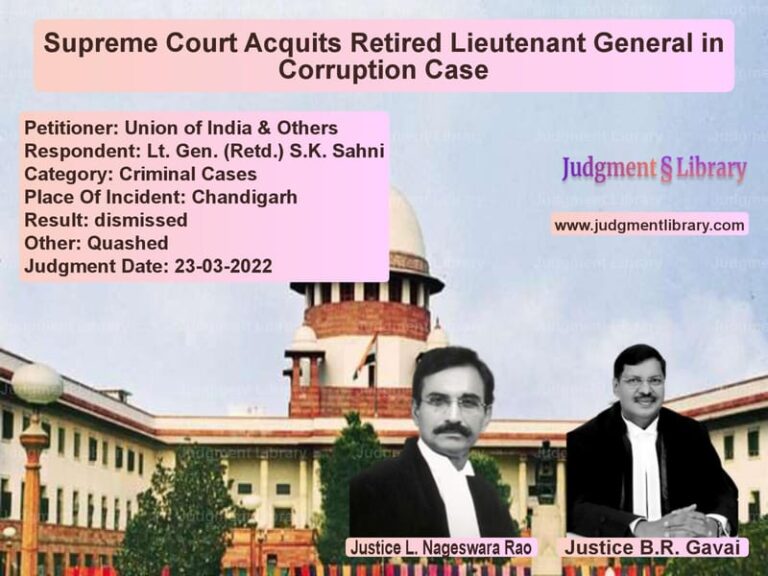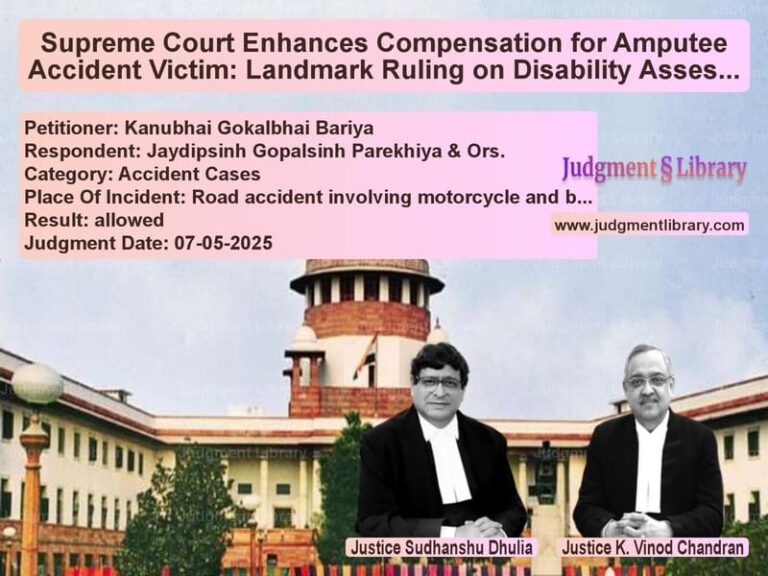Supreme Court Mandates Nationwide Vulnerable Witness Deposition Centres
The Supreme Court of India has issued a landmark judgment in the case of Smruti Tukaram Badade vs. State of Maharashtra & Anr., reinforcing the need for Vulnerable Witness Deposition Centres (VWDCs) across the country. The ruling establishes a comprehensive framework for ensuring that witnesses, particularly victims of sexual violence, children, and other vulnerable individuals, have access to safe and secure environments for recording their statements in judicial proceedings.
Background of the Case
The case originated when the appellant, Smruti Tukaram Badade, approached the Supreme Court regarding the lack of a structured mechanism to protect vulnerable witnesses during trial proceedings. The appellant highlighted the psychological and emotional distress experienced by victims and vulnerable witnesses due to the traditional court environment, which often exposes them to undue intimidation and fear.
The Supreme Court had previously addressed the need for protective measures in cases like Sakshi vs. Union of India and State of Maharashtra vs. Bandu @ Daulat. These cases underscored the necessity of special facilities and procedural safeguards to ensure that vulnerable witnesses could testify without facing undue pressure or trauma.
In response to the petition, the Court sought reports from various High Courts regarding the existing infrastructure for vulnerable witnesses. Based on the findings, the Court issued a set of comprehensive guidelines to establish and standardize VWDCs nationwide.
Arguments by the Petitioner (Smruti Tukaram Badade)
- The petitioner argued that the current judicial setup failed to provide adequate protection to vulnerable witnesses, especially in cases involving sexual violence and child victims.
- She highlighted the distressing experience of victims who had to face their perpetrators in open courtrooms, leading to secondary victimization.
- The petitioner emphasized that the lack of dedicated deposition centres in most states resulted in inconsistent procedures and uneven access to justice.
- She urged the Court to mandate a uniform framework ensuring that all courts have VWDCs with specialized infrastructure and trained personnel.
Arguments by the Respondents (State of Maharashtra & Others)
- The State of Maharashtra submitted that while some vulnerable witness protection measures existed, there was no uniform standard applicable across all courts.
- It was argued that implementing VWDCs required significant financial resources, and states needed clear guidelines to facilitate the process.
- The respondents maintained that many High Courts had already taken steps to establish vulnerable witness deposition facilities and requested the Supreme Court to consider the existing efforts.
- They assured the Court that if comprehensive guidelines were provided, state governments and judicial authorities would comply in a phased manner.
Observations of the Supreme Court
The Supreme Court bench, comprising Justices D.Y. Chandrachud and Surya Kant, issued detailed directions under Article 142 of the Constitution to ensure nationwide implementation of VWDCs.
The Court noted:
“The dignity of person, which is an intrinsic element of Article 21 of the Constitution, cannot be left to the vagaries of insensitive procedures and a hostile environment. Access to justice mandates that positive steps be adopted to create a barrier-free environment.”
Read also: https://judgmentlibrary.com/supreme-court-cancels-bail-in-rajasthan-murder-case-upholds-rule-of-law/
Regarding the need for a standardized approach, the Court stated:
“There is a pressing need to facilitate the salutary purpose underlying the creation of a barrier-free environment where depositions can be recorded freely without constraining limitations, both physical and emotional. This requires not just the creation of infrastructure but sensitizing all stakeholders.”
The Court directed the adoption of guidelines modeled on the framework established by the Delhi High Court for Vulnerable Witness Deposition Centres, which had already been implemented successfully.
Final Judgment
- The Supreme Court directed all High Courts to notify a Vulnerable Witness Deposition Centres Scheme within two months.
- Each High Court must establish at least one permanent VWDC in every District Court establishment (or additional Sessions Court establishments) within four months.
- A VWDC Committee must be set up in every High Court to oversee implementation and monitor the adequacy of infrastructure.
- The Court appointed Justice Gita Mittal, former Chief Justice of the Jammu and Kashmir High Court, to lead the national training and implementation program for VWDCs.
- The Ministry of Women and Child Development was tasked with ensuring financial support and logistical coordination for the execution of the Court’s directives.
Implications of the Judgment
- Nationwide Implementation: The ruling ensures that vulnerable witnesses in all states receive protection and support during legal proceedings.
- Standardization of Procedures: The creation of uniform guidelines will eliminate disparities in how different courts handle vulnerable witnesses.
- Psychological Support: The establishment of VWDCs will help reduce the trauma faced by victims and vulnerable witnesses during testimony.
- Enhanced Training: Judges, lawyers, and court staff will undergo specialized training to manage cases involving vulnerable witnesses sensitively.
- Judicial Oversight: The decision mandates continuous monitoring to ensure effective implementation and refinement of procedures as needed.
Conclusion
The Supreme Court’s decision in this case is a historic step towards ensuring a safe and supportive environment for vulnerable witnesses. By mandating the establishment of VWDCs across the country, the judgment strengthens the fundamental rights of victims and witnesses while enhancing the integrity of the judicial process. The ruling sets a precedent for ensuring that justice is not only done but is seen to be done in a manner that upholds the dignity and safety of all individuals involved in legal proceedings.
Petitioner Name: Smruti Tukaram Badade.Respondent Name: State of Maharashtra & Anr..Judgment By: Justice D.Y. Chandrachud, Justice Surya Kant.Place Of Incident: Maharashtra.Judgment Date: 11-01-2022.
Don’t miss out on the full details! Download the complete judgment in PDF format below and gain valuable insights instantly!
Download Judgment: smruti-tukaram-badad-vs-state-of-maharashtra-supreme-court-of-india-judgment-dated-11-01-2022.pdf
Directly Download Judgment: Directly download this Judgment
See all petitions in Juvenile Justice
See all petitions in Bail and Anticipatory Bail
See all petitions in SC/ST Act Case
See all petitions in Custodial Deaths and Police Misconduct
See all petitions in Judgment by Dhananjaya Y Chandrachud
See all petitions in Judgment by Surya Kant
See all petitions in allowed
See all petitions in Quashed
See all petitions in supreme court of India judgments January 2022
See all petitions in 2022 judgments
See all posts in Criminal Cases Category
See all allowed petitions in Criminal Cases Category
See all Dismissed petitions in Criminal Cases Category
See all partially allowed petitions in Criminal Cases Category







